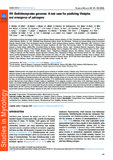Mostrar el registro sencillo del ítem
101 Dothideomycetes genomes: a test case for predicting lifestyles and emergence of pathogens
| dc.creator | Haridas, Sajeet | es_ES |
| dc.creator | Castanera Andrés, Raúl | es_ES |
| dc.creator | Culley, D. E. | es_ES |
| dc.creator | Daum, C. | es_ES |
| dc.creator | Ramírez Nasto, Lucía | es_ES |
| dc.creator | Alfaro Sánchez, Manuel | es_ES |
| dc.date.accessioned | 2020-08-05T06:00:24Z | |
| dc.date.available | 2020-08-05T06:00:24Z | |
| dc.date.issued | 2020 | |
| dc.identifier.issn | 0166-0616 | |
| dc.identifier.uri | https://hdl.handle.net/2454/37656 | |
| dc.description.abstract | Dothideomycetes is the largest class of kingdom Fungi and comprises an incredible diversity of lifestyles, many of which have evolved multiple times. Plant pathogens represent a major ecological niche of the class Dothideomycetes and they are known to infect most major food crops and feedstocks for biomass and biofuel production. Studying the ecology and evolution of Dothideomycetes has significant implications for our fundamental understanding of fungal evolution, their adaptation to stress and host specificity, and practical implications with regard to the effects of climate change and on the food, feed, and livestock elements of the agro-economy. In this study, we present the first large-scale, whole-genome comparison of 101 Dothideomycetes introducing 55 newly sequenced species. The availability of whole-genome data produced a high-confidence phylogeny leading to reclassification of 25 organisms, provided a clearer picture of the relationships among the various families, and indicated that pathogenicity evolved multiple times within this class. We also identified gene family expansions and contractions across the Dothideomycetes phylogeny linked to ecological niches providing insights into genome evolution and adaptation across this group. Using machine-learning methods we classified fungi into lifestyle classes with >95 % accuracy and identified a small number of gene families that positively correlated with these distinctions. This can become a valuable tool for genome-based prediction of species lifestyle, especially for rarely seen and poorly studied species. | en |
| dc.description.sponsorship | This manuscript has been authored by an author at Lawrence Berkeley National Laboratory under Contract No. DE-AC02-05CH11231 with the U.S. Department of Energy. R. A. and I. V. G. were supported by the NSF grants DEB-1354625 and IOS-1456958. Sequencing of Dothideomycetes genomes were conducted as part of the 1000 Fungal Genomes Project supported by the JGI Community Sequencing Project #662. | en |
| dc.format.extent | 13 p. | |
| dc.format.mimetype | application/pdf | en |
| dc.language.iso | eng | en |
| dc.publisher | Westerdijk Fungal Biodiversity Institute | en |
| dc.relation.ispartof | Studies in Mycology, 2020, 96, 141-153 | en |
| dc.rights | © 2020 Westerdijk Fungal Biodiversity Institute. Production and hosting by ELSEVIER B.V. This is an open access article under the CC BY-NC-ND license. | en |
| dc.rights.uri | http://creativecommons.org/licenses/by-nc-nd/4.0/ | |
| dc.subject | Fungal evolution | en |
| dc.subject | Genome-based prediction | en |
| dc.subject | Machine-learning | en |
| dc.subject | New taxa | en |
| dc.title | 101 Dothideomycetes genomes: a test case for predicting lifestyles and emergence of pathogens | en |
| dc.type | info:eu-repo/semantics/article | en |
| dc.type | Artículo / Artikulua | es |
| dc.contributor.department | Institute for Multidisciplinary Research in Applied Biology - IMAB | es_ES |
| dc.rights.accessRights | info:eu-repo/semantics/openAccess | en |
| dc.rights.accessRights | Acceso abierto / Sarbide irekia | es |
| dc.identifier.doi | 10.1016/j.simyco.2020.01.003 | |
| dc.relation.publisherversion | https://doi.org/10.1016/j.simyco.2020.01.003 | |
| dc.type.version | info:eu-repo/semantics/publishedVersion | en |
| dc.type.version | Versión publicada / Argitaratu den bertsioa | es |



